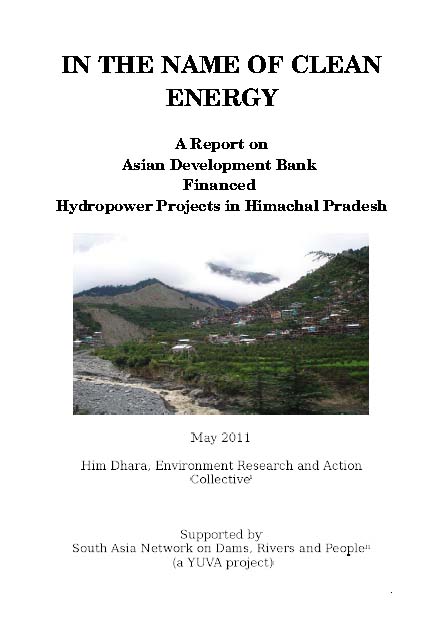/topics/renewable-energy
Renewable Energy
Biomass for sustainable development - Lessons for decentralized energy delivery in India – A report by World Bank
Posted on 22 Aug, 2011 07:55 PM It presents a summary of recommendations for enhancing the effectiveness of energy service delivery through a decentralized program, which currently finds a critical place in the Government‘s energy policies and electrification targets.
It presents a summary of recommendations for enhancing the effectiveness of energy service delivery through a decentralized program, which currently finds a critical place in the Government‘s energy policies and electrification targets.
The pilot phase of the Village Energy Security Programme has shown several lessons and the need for improvements.
Small and mini hydel projects – Standing Committee on Energy – Sixteenth Report (2010-2011)
Posted on 03 Aug, 2011 03:57 PMThe Committee took evidence of the representatives of the Ministry of New and Renewable Energy (MNRE) in January, 2011.
The water wheels of time: Micro hydro power in the Western Ghats of India
Posted on 28 Jun, 2011 09:50 AM"Climate change" - Understanding the connections with energy use, and how India's galloping economic growth and insatiable appetite for energy can be balanced with environmental security?
Posted on 18 Jun, 2011 12:52 AM
Introduction: Energy versus emissions: The big challenge of the new millennium
By Rakesh Kalshian
To maintain its economic growth rate of 8-10%, India needs all the energy it can get. But the momentum of economic growth overrides crucial environmental concerns.
Hotting up: The science and politics of climate change
By Aditi Sen
The world is hotting up. Climate systems are changing. The 1990s were the hottest decade ever, sea levels rose by 10-20 cm during the 20th century, and atmospheric carbon dioxide levels are 31% higher than in 1750.
Centre for Science and Environment is looking for Team Head - Renewable Energy Programme
Posted on 26 May, 2011 12:59 PMThe Centre for Science and Environment, a non-profit institution known for its rigorous and scientific policy research and advocacy on environmental issues is looking for a Team Head to steer its Renewable Energy Programme.
In the name of clean energy – A report on Asian Development Bank financed hydropower projects in Himachal Pradesh
Posted on 25 May, 2011 07:06 PM This report by Him Dhara, an environmental research and action collective, deals with the Asian Development Bank financed hydropower projects in Himachal Pradesh, which are leading to obstruction of the rivers and their consequent disappearance for harnessing energy and making ‘judicious’ use of the water. Within the hydro sector the attention has turned to the Indian Himalayan region which is estimated to have seventy nine per cent of the total hydropower potential of the country.
This report by Him Dhara, an environmental research and action collective, deals with the Asian Development Bank financed hydropower projects in Himachal Pradesh, which are leading to obstruction of the rivers and their consequent disappearance for harnessing energy and making ‘judicious’ use of the water. Within the hydro sector the attention has turned to the Indian Himalayan region which is estimated to have seventy nine per cent of the total hydropower potential of the country.
The technology of ‘run of the river’ (ROR) used to tap “the flow of rivers” in high gradient zones to generate power has given impetus to setting up of hydro-projects in the Himalayan states. In India, the mountainous region of the Himalayas offered the “perfect setting” for such projects, with the availability of several flowing water sources that could be tapped before they reached the plains. Of the Himalayan states, after Arunachal Pradesh, Himachal Pradesh is second in line with a hydropower potential of about 21000 MW. The installed capacity has increased twenty fold (from 326 MW to 6370 MW) in the last ten years indicating the frenzied pace of hydropower development in the state.
Purushottam Patel's biogas-driven irrigation pump - A video case study
Posted on 12 Apr, 2011 12:04 PM
Pest and disease management in organic, natural, sustainable agriculture - Presentations from the South Asia Conference on "Outstanding Organic Agriculture Techniques", Bangalore organised by OFAI (2009)
Posted on 20 Mar, 2011 06:17 PM This set of presentations from the conference on Outstanding Organic Agriculture Techniques held during September 2009 at Bangalore deals with pest and disease management practices in organic farming, which rely primarily on preventive and integrated methods.
This set of presentations from the conference on Outstanding Organic Agriculture Techniques held during September 2009 at Bangalore deals with pest and disease management practices in organic farming, which rely primarily on preventive and integrated methods.
Crop production and plan protection in organic farming
This paper by S R Sundararaman presents organic farming as the only recourse for farmers, to save both livelihood and the health of the soil. Organic farming methods enable farmers save money and turn their farmyard waste into value-added products for increasing crop production. Farmers will not have to be dependent on agri-business companies for seeds, fertilizers and pesticides. Our self-reliance is thus preserved. A large portion of our country's foreign exchange is used to pay for the import of petroleum products. By going organic we will also help our country save on valuable foreign exchange. Our land will keep giving us returns for extended periods of time unlike farming as per the green revolution, where the land stays productive for a short time and then becomes sterile.
The uppermost question in the minds of farmers who have recently converted to organic farming or who want to turn organic is how to ensure that crop production does not reduce and how to protect the plants from disease, without the chemical fertilizers and pesticides that their fields have grown used to. This paper provides the answers and it also seeks to reassure all farmers that there is no farm which cannot turn around and produce quality crops in sufficient quantity, using organic farming methods.
Water job via Devex dated 4th February, 2011
Posted on 05 Feb, 2011 10:09 AMContent courtesy: Devex
- Energy & Water Analysts
Social Impact
Location: India
Last Date: 10th February, 2011
Read more
Towards adopting nanotechnology in irrigation: Micro irrigation systems
Posted on 21 Jan, 2011 07:36 PMIndia is predominantly an agricultural country and even with current orientation towards services, still agriculture contributes ¼th of total GDP of the country, 15 percent of total export and 65 % of total population’s livelihood.





